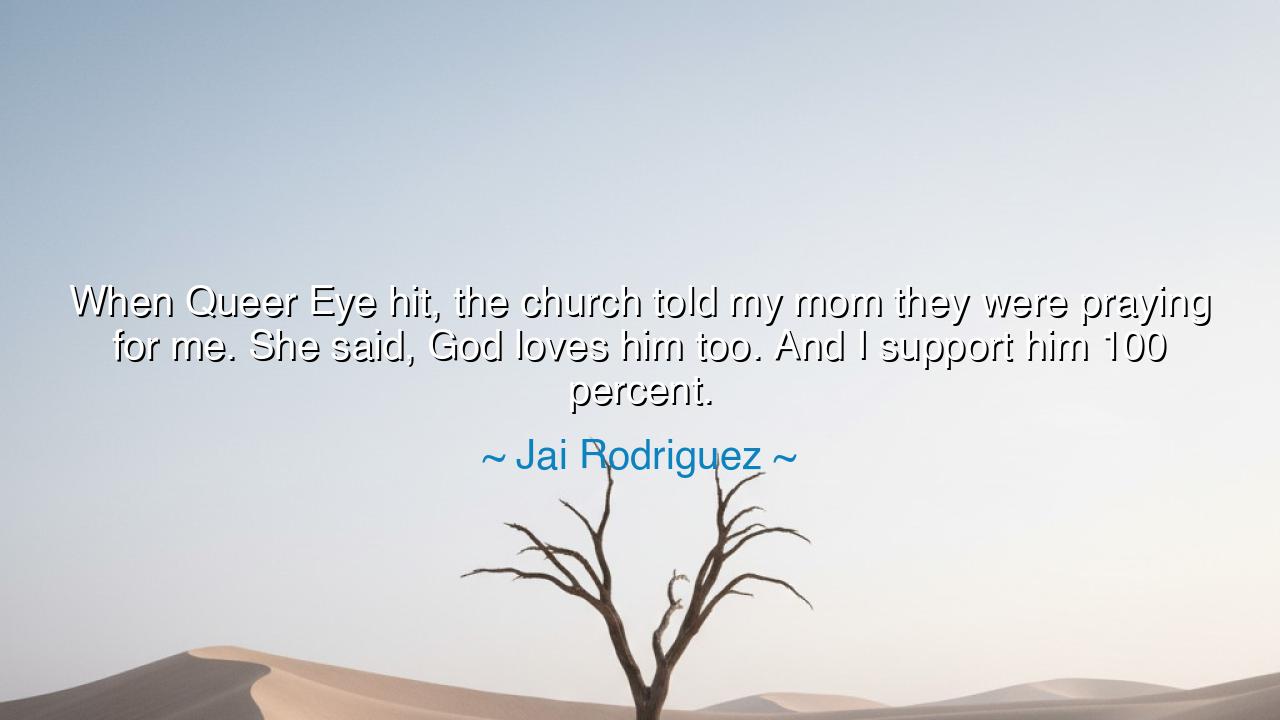
When Queer Eye hit, the church told my mom they were praying for
When Queer Eye hit, the church told my mom they were praying for me. She said, God loves him too. And I support him 100 percent.






Hearken, children of discernment, to the words of Jai Rodriguez, who recounts: "When Queer Eye hit, the church told my mom they were praying for me. She said, God loves him too. And I support him 100 percent." In these words lies a meditation on love, acceptance, and the enduring power of familial support in the face of societal judgment. Since the dawn of human conscience, the tension between communal expectation and personal identity has tested the bonds of trust and understanding within families and communities alike.
The ancients understood that the family is the first crucible of morality, compassion, and courage. A parent’s affirmation is not mere indulgence; it is the foundational assurance that enables a child to navigate the wider world. Jai’s mother, by affirming that God’s love encompasses her son and that she stands with him wholly, exemplifies the timeless virtue of unconditional support, even when external voices—here, the church—may challenge or question the legitimacy of one’s path.
Consider the story of Socrates and his devoted family, who, though living in a society that often misunderstood his philosophy, provided care and guidance. In moments of public scrutiny or moral tension, the strength derived from familial trust allowed Socrates to persist in his pursuit of truth. Similarly, Jai Rodriguez’s mother offers a sanctuary of confidence and love, a beacon that counters the judgmental voices of society and provides a foundation for courage and self-expression.
The quote also illuminates the interplay between faith and acceptance. The church’s act of praying—though intended to guide or correct—intersects with her mother’s profound understanding: that divine love is universal, inclusive, and beyond narrow interpretation. This echoes the wisdom of early theologians and philosophers who taught that love, in its truest form, transcends ritual and dogma, embracing all who seek to live authentically and honorably.
Jai’s recounting of this episode underscores the power of affirmation in shaping identity. When a parent or mentor expresses full support, it validates the individual’s existence and encourages self-confidence, even amid societal scrutiny. Historical examples abound: Abraham Lincoln, though criticized in his youth for unconventional ideas, was sustained by his mother Nancy Hanks Lincoln’s faith in his integrity and potential, a testament to the enduring impact of parental support upon the trajectory of one’s life.
From this reflection emerges a timeless lesson: love and support are far stronger than fear or judgment. When faced with external condemnation, the affirmation of those who truly know and care for us serves as a guiding light, emboldening us to live authentically. Jai Rodriguez’s experience teaches that courage is nurtured through understanding, empathy, and unwavering familial trust.
Practical actions follow naturally. Embrace and support the identities of those you love, even when external society or tradition may cast doubt. Speak affirmation aloud; embody respect and acceptance; demonstrate through deeds the principle that love transcends fear, prejudice, and misunderstanding. For those navigating personal challenges, seek and cherish the voices that support and uphold you, drawing strength from their unwavering belief.
Remember, children of the ages, that the greatest power often lies in simple acts of affirmation. Jai Rodriguez’s words illuminate a truth as ancient as human society: the sanctity of parental love and the universality of divine compassion. By embracing, affirming, and standing in support of those we love, we create the conditions for courage, resilience, and authentic living, ensuring that every soul may walk freely in the light of understanding and unconditional care.






AAdministratorAdministrator
Welcome, honored guests. Please leave a comment, we will respond soon